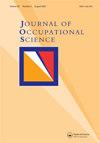“This pandemic has changed our daily living”: Young adults’ leisure experiences during the COVID-19 pandemic in South Africa
IF 2.4
Q1 SOCIAL SCIENCES, INTERDISCIPLINARY
引用次数: 5
Abstract
ABSTRACT The COVID-19 pandemic is a global human ecosystem disruption affecting almost every facet of daily living. South Africa adopted a risk-adjusted approach comprising five-levels to curb the spread of COVID-19. Early in 2020, the country experienced level 5 and 4 restrictions, indicating high COVID-19 spread with low to moderate health system readiness. South Africans were largely confined to their homes. This study explored young adults’ experiences of leisure engagement during the confinement, adaptations made, and the influence on health and well-being. Thirteen occupational therapy student researchers conducted individual qualitative, exploratory-descriptive studies on young adults’ leisure experiences during the level 5 and 4 confinements. The authors used a qualitative meta-analytic approach to review the student researchers’ primary studies and synthesize findings for this paper. The sample comprised 65 participants aged 18 to 32 years (mean age 22.2 years), the majority being either students or employed. Participants were interviewed online or submitted written responses to open-ended questions focusing on their leisure engagement during the confinement. Relevant data were extracted from the primary studies and analyzed thematically. Four themes emerged: 1) disruption, 2) time, 3) adaptations to change, and 4) leisure benefits. Although participants experienced the confinement as disruptive, and restricting their leisure and social engagement, they adapted and developed new leisure occupations, which had a positive influence on their health and well-being. In conclusion, the young adults dealt with the occupational injustices of confinement by adapting their leisure engagement, thus displaying occupational resilience, which positively influenced health and well-being.“这场大流行改变了我们的日常生活”:南非新冠肺炎大流行期间年轻人的休闲体验
摘要新冠肺炎大流行是一场全球性的人类生态系统破坏,几乎影响到日常生活的方方面面。南非采取了包括五个层面的风险调整方法,以遏制新冠肺炎的传播。2020年初,该国经历了5级和4级限制,表明新冠肺炎传播率高,卫生系统准备程度低至中等。南非人基本上被限制在家里。这项研究探讨了年轻人在禁闭期间的休闲体验、所做的适应以及对健康和幸福的影响。13名职业治疗学生研究人员对5级和4级禁闭期间年轻人的休闲体验进行了个体定性、探索性描述性研究。作者使用定性元分析方法来回顾学生研究人员的初步研究,并为本文综合研究结果。样本包括65名年龄在18至32岁之间(平均年龄22.2岁)的参与者,其中大多数是学生或在职人员。参与者接受了在线采访,或提交了对开放式问题的书面答复,重点是他们在禁闭期间的休闲活动。从初步研究中提取相关数据,并进行专题分析。出现了四个主题:1)破坏,2)时间,3)适应变化,以及4)休闲福利。尽管参与者经历了破坏性的禁闭,限制了他们的休闲和社交活动,但他们适应并发展了新的休闲职业,这对他们的健康和福祉产生了积极影响。总之,年轻人通过调整他们的休闲活动来应对禁闭带来的职业不公正,从而表现出职业韧性,这对健康和福祉产生了积极影响。
本文章由计算机程序翻译,如有差异,请以英文原文为准。
求助全文
约1分钟内获得全文
求助全文
来源期刊

Journal of Occupational Science
SOCIAL SCIENCES, INTERDISCIPLINARY-
CiteScore
4.30
自引率
41.70%
发文量
46
 求助内容:
求助内容: 应助结果提醒方式:
应助结果提醒方式:


